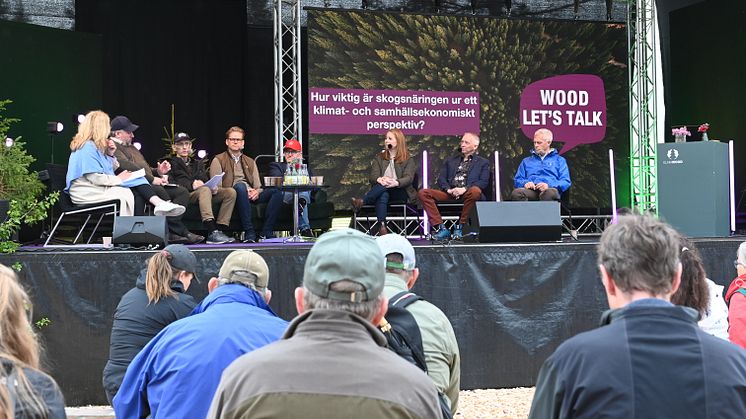
Press release -
Swedish politicians debate forestry issues at Elmia Wood
Friday’s politicians’ debate attracted a large audience to the stage at Wood Square. All the parties in Sweden’s Riksdag were represented except the Green Party, which declined to participate.
The discussions revolved around hot election issues such as ownership and use rights, the role of the EU in regulating Swedish forestry, legislation and regulation, and biofuels and the obligation to reduce emissions.
On stage were Johan Widegren (Moderate Party), Annie Lööf (Centre Party), Mats Nordberg (Sweden Democrats Party), Jakob Olofsgård (Liberal People’s Party), Isak From (Social Democratic Party), Birger Lahti (Left Party) and Kjell-Arne Ottosson (Christian Democrats). Moderator Ellinor Persson began by asking what they were passionate about in the forestry debate:
“Obviously for farmers and foresters, for their right to manage forests without state interference. I think that can deliver the best forest and climate benefits,” Johan Widegren replied.
“I am passionate about forestry gaining the public’s trust. The media often highlight the bad things but I know how much good is happening in Sweden’s forests, and when it comes to those forests, I am very keen that they should be managed with as little impact as possible from EU rules and requirements,” Birger Lahti said.
“I agree. There is a huge difference between a Greek olive grove and Swedish production forestry. I grew up with the forest. The forest is the backbone of the rural economy, of the entire Swedish economy, and has a crucial role in the green transition,” added Annie Lööf.
The forest owner in the driving seat
The climate of the debate was good and the opinions were sometimes in surprising agreement.
“The forest owner must be in the driving seat in forest policy. Not everyone has to do the same thing. And we really need to push for as little EU interference in forest regulation as possible. Each country has its own forests, its own conditions,” said Mats Nordberg.
“Forests are our great competitive advantage in the green transition. But it will only be so if we are allowed to own and harvest the forests. Ownership and the right to use forests are central,” said Kjell-Arne Ottosson.
“The individual forest owner’s right of ownership and use underpins Swedish forestry,” added Jakob Olofsgård.
“Then combine that with an industrial mindset. Protecting forest products and the industry. That is also important,” Isak From said.
A long-term approach is the foundation
What directions should Swedish forest policy take if you could decide?
“Freedom under responsibility. Of course, there must be an overall legislative framework but we must trust the individual forest owner a great deal. What you own you take care of,” argued Annie Lööf.
“We must dare to take a long-term view. The forest owner must be allowed to harvest what he has sown,” said Kjell-Arne Ottosson.
“A long-term approach is key. Otherwise we will lose other values. I believe in a combination of legislation and responsible management. No forest owner wants to make deliberate mistakes,” added Birger Lahti.
At the end of the debate there was a bit of a spark when the question was asked about what is at stake in the national elections this autumn:
“The government we get will determine whether or not we have a government that clearly believes in the forest owner’s ability and personal responsibility. We want to lift up the individual landowner,” said Kjell-Arne Ottosson.
“The conditions for the entire rural countryside are at stake,” added Annie Lööf.
“And if we look beyond the forest, society as a whole is at stake. We must build a cohesive society,” Birger Lahti concluded.
If you missed the debate you will be able to watch it here on the website.
